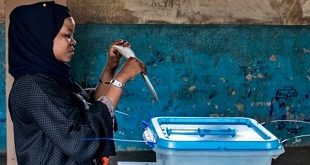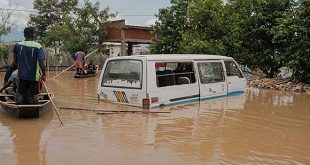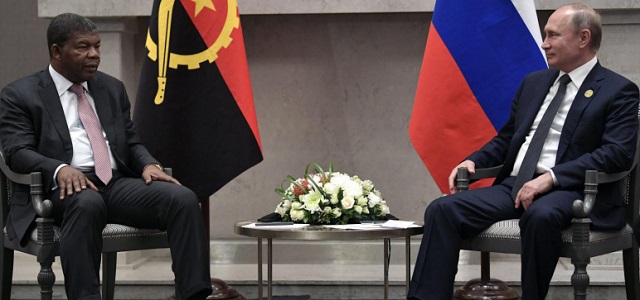
Why the new development could be bad news for the US, Europe and India
Kampala, Uganda | ISAAC KHISA | As Russia’s President, Vladimir Putin, hosts more than 50 African presidents for the first-ever Russia-Africa Summit in Sochi on Oct. 24, top on the agenda will be how to sustain the economic and political ties between the two trading blocs in the wake of declining oil prices and increasing isolation of the transcontinental nation.
Russia’s economy has been on a standstill for a while, with statistics showing that from 2014 to 2018, its GDP grew at an average of 0.4% per annum, with real disposable incomes declining by 10.7% leaving 19 million of the 145million Russian population in poverty during the same period under review.
To make the situation worse, in 2018 alone, thousands of Russian companies are said to have closed their operations thanks to diplomatic isolation from Europe and the US over Syria. This is in addition to Russia’s aggression towards Ukraine in 2014 (annexation of Crimea).
On the other hand, Africa’s GDP has been growing at an average of more than 3%, making it one of the fastest growing regions in the world. Faced with this situation amidst growth prospects in Africa, Russia seems to have remained with no alternative but to seek for a renewed partnership with the continent.
Moscow, which had a strong influence in Africa alongside US and China, had frozen its relations with the continent following the collapse of the Soviet Union (USSR) in 1991.
However, Putin seems to be having new aspirations in Africa with the restoration of his country’s strong links with the continent top on the agenda.
It however remains to be seen how far Russia’s reconnection with the continent will go given that China, India, and especially the United States have intensified their involvement in Africa over the last three decades.
The past relations between Russia and African countries placed an emphasis on political ideology, but now, this has shifted. Moscow wants to deepen its understanding of the business climate and explore trade and partnership opportunities on the continent.
Data from the Russian Export Centre (REC), a state institution that provides Russian exporters and their foreign partners with a wide range of financial and nonfinancial support measures, shows that Russia’s export values to Africa have nearly doubled over the last five years from US$9.3bn in 2014 to US$17.5bn in 2018. Most of the exports to Africa are medicine, food, forestry products, automotive and mixed fertilizer.
On the other hand, Russia’s imports from Africa have stagnated, having increased from merely US$2.8bn to US$2.9bn during the same period under review.
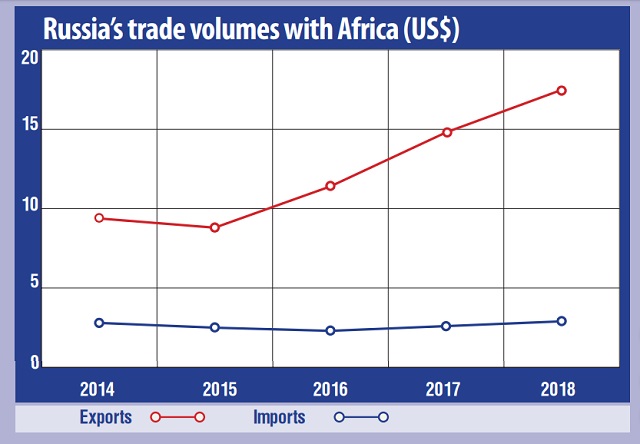
Afreximbank meeting
It is this prevailing condition that when Russia hosted the Annual General Meeting for the African Export Import Bank (Afreximbank) on June 20-22, the second AGM to be held out of Africa since 2012 in Beijing China, Prime Minister Dmitri Medvedev, said it provided a good momentum ahead of the planned RussiaAfrica Summit.
Russia, through the Russian Export Center (REC), purchased shares in Afreximbank in 2017 at an undisclosed amount, becoming the bank’s third-largest non-African financial institution.
Other shareholders in the Bank that now boasts of US$15bn in asset include a mix of African governments including Uganda, central banks, regional and sub-regional institutions, private investors and financial institutions, as well as non-African financial institutions, export credit agencies and private investors.
Medvedev said Russia and Africa must harness their immense resources, which account for half of the world’s resources –diamond, gold, graphite, pozzolana, iron ore, phosphates and copper, among others – to foster a greater economic future for its people.
He said whereas Russia’s presence in Africa had weakened in the 1990s, the country had since then done a great deal of groundwork on joint projects in geology and mining, energy, industry, agriculture, fishing and telecommunications, with total investments now standing at US$20bn.
Some of Russia’s companies that have made inroads in Africa include; Gazprom, Lukoil, Rostec and Rosatom, with most of their operations in Uganda, Algeria, Angola, Egypt and Nigeria.
Egypt has also finalised negotiations with Moscow to build the country’s first nuclear plant, while in Namibia, Moscow is developing one of the world’s largest deposits of platinum group metals.
Russia has also been re-establishing links with Angola and Botswana, where Alrosa, the Russian giant, mines diamonds.
Similarly, Russia has interests in Zimbabwe, Sierra Leone, Ethiopia, Morocco, Democratic Republic of Congo, Sudan, and the Central African Republic.
Matters security
Since 2015, Russia has signed over 20 bilateral military cooperation agreements with African states including; Rwanda, Tanzania, Burkina Faso, Burundi, Guinea, according to the Swedish Defence Research Agency.
The agency says there is also heated speculation about the potential for establishing military bases in several countries including Burundi, Mozambique, Eritrea, Somaliland, Egypt, Libya and Sudan.
According to the Stockholm International Peace Research Institute (SIPRI), between 2012 and 2016, Russia had become the largest supplier of arms to Africa, accounting for 35% of arms exports to the region, followed by China (17 %), the United States (9.6%), and France (6.9 %).
The arms export, the Institute says, is considered as a lucrative area for Russian economic growth, especially in the context of continued Western sanctions and a stagnant economy caused by falling global oil prices.
The Institute says that exports of Russian-made weapons and military equipment to Africa amount to US $4.6bn annually, with a contract portfolio worth over US$50bn.
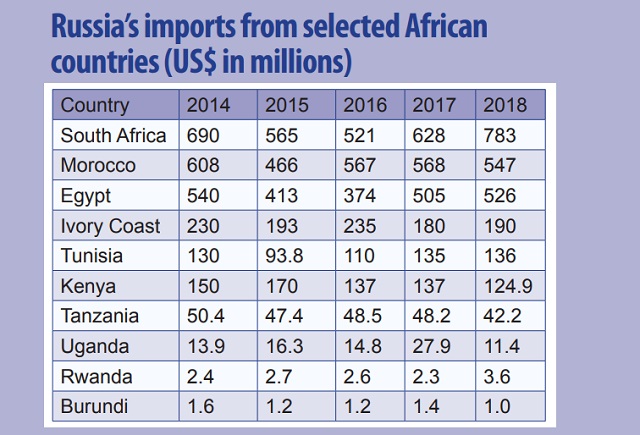
 The Independent Uganda: You get the Truth we Pay the Price
The Independent Uganda: You get the Truth we Pay the Price

